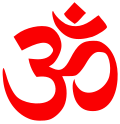
Back جودابادا Arabic Gaudapada AST গৌড়পাদ Bengali/Bangla Gaudapada Catalan Gaudapáda Czech Gaudapada German Gaudapada Spanish Gaudapada Basque Gaudapada Finnish Gaudapada French
Gauḍapāda | |
|---|---|
 Adi Guru Shri Gauḍapādāchārya | |
| Religious life | |
| Religion | Hinduism |
| Founder of | Shri Gaudapadacharya Math |
| Philosophy | Advaita Vedanta |
| Part of a series on |
| Advaita |
|---|
|
|
| Part of a series on | |
| Hindu philosophy | |
|---|---|
 | |
| Orthodox | |
|
|
|
| Heterodox | |
|
|
|
Gauḍapāda (Sanskrit: गौडपाद; fl.c. 6th century CE),[1] also referred as Gauḍapādācārya (Sanskrit: गौडपादाचार्य; "Gauḍapāda the Teacher"),[2] was an early medieval era Hindu philosopher and scholar of the Advaita Vedanta school of Hindu philosophy.[3][4] While details of his biography are uncertain, his ideas inspired others such as Adi Shankara who called him a Paramaguru (highest teacher).[2][5]
Gaudapada was the author or compiler of the Māṇḍūkya Kārikā, also known as Gaudapada Karika.[6] The text consists of four chapters (also called four books[7]), of which Chapter Four[8] uses Buddhist terminology thereby showing it was influenced by Buddhism.[9] However, doctrinally Gaudapada's work is Vedantic, and not Buddhist.[3][10][11] The first three chapters of Gaudapada's text have been influential in the Advaita Vedanta tradition. Parts of the first chapter that include the Mandukya Upanishad have been considered a valid scriptural source by the Dvaita and Vishistadvaita schools of Vedanta.[8][12]
- ^ Raju 1971, p. 177.
- ^ a b Potter 1981, p. 103.
- ^ a b Potter 1981, p. 105.
- ^ TRV Murti (1955), The central philosophy of Buddhism, Routledge (2008 Reprint), ISBN 978-0-415-46118-4, page 114
- ^ Sarma 2007, pp. 125–126.
- ^ Nakamura 2004, p. 308.
- ^ Potter 1981, pp. 106–111.
- ^ a b Cite error: The named reference
trvmurti114was invoked but never defined (see the help page). - ^ Isayeva, N. (1992). Shankara: A Hindu Revivalist or a Crypto-Buddhist? (Thesis). Georgia State University. p. 23. Archived from the original on 19 February 2025.
According to Hacker (1952), the profound influences of Buddhism on Gaudapada were from the Lankavatara-sutra and the writings of Nagarjuna and Vasuvandhu. Thus, some scholars are of the opinion that he was a 'crypto-Buddhist.' Isayeva says, 'His work mandukya-karika was undoubtedly composed under the direct impact of Buddhist ideas'.
- ^ Cite error: The named reference
trvmurti116was invoked but never defined (see the help page). - ^ Nakamura 2004, p. 311.
- ^ Cite error: The named reference
iepgaudawas invoked but never defined (see the help page).